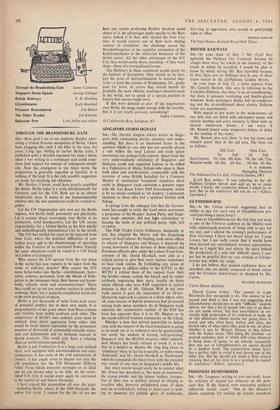SINGAPORE STORM SIGNALS SIR,—Mr. Derrick Sington always writes on Singa-
pore with outstanding clarity, accuracy and under- standing. But there is an emotional factor in the question which no one who has not actually played a role within the local Labour and trade union movement can perhaps fully express. Apart from the very understandable reluctance of Singapore and Malayan youth and organised Labour to be stifled in a Federation of Malay Sultans.who seem to them both alien and anachronistic, comparable with the aversion of some British Socialists for a Common Market of continental 'bourgeois' countries, there exists in Singapore trade unionism a genuine anger with Mr. Lee Kuan Yew's PAP Government, which is by no means confined to 'six leaders,' Communist elements or those who feel a spiritual kinship with Peking.
It springs from the unhappy fact that the Govern- ment has sought to make the local union movement a projection of the Peoples' Action Party, and Singa- pore trade unionists did not fight colonialism to become the tools of any political party, right, left or centre.
The PAP Trades Union Ordinance, designedly or not, has crippled the liberty and the bargaining power of local labour. By limiting trade union offices to citizens of Singapore. and Malaya it deprived the young movement of the services of those Indian and European officials who, under the Labour Front Gov- ernment of Mr. David Marshall, were able at a critical period to give their more mature experience to local trade unions. By forbidding any union or union group to affiliate either to the ICFTU or the WFTU it robbed them of the support from their big brother unions outside the Island, and by rather tactlessly impressing their party loyalty on those union officials who were PAP supporters (a typical instance is that of Mr. Othman Wok in my own trade union) it gave the impression of an all-too- Muscovite approach to unions in a place where, after all, some lessons of British democracy had permeated among trade union members. So to Singapore trade unionists the 'constructive realism' of the PAP has been less apparent than it is to Mr. Sington or to the much-relieved business community on the Island.
Whether a base that proved impossible to defend even with the support of the local population is going to be much use to us without it may be questionable, but surely the wisdom of forcing 'self-governing' Singapore into the SEATO structure while indepen- dent Malaya has firmly refused to touch it, is not. Nor is it helpful to dismiss Mr. Ong Eng Guan as 'ambitious' when in fact he is equally, or rather more, 'dedicated,' and Mr. David Marshall as 'flamboyant' when he commands the finest brain with the proudest war record of any man in Singapore's public life.
Our wiser course would surely be to contact what Mr. Nixon has described as 'the wave of tomorrow,' the young people and the labour leaders, irrespec- tive of their race or politics, instead of clinging to royalties who, however enlightened some of them may be as individuals, belong to Asia's past or seek- ing to resurrect the pristine glory of politicians, left-wing in opposition, who turned so gratifyingly right in office.
GEORGE E.D1NGER The Sack House, Hatfield Broad Oak. Essex


































 Previous page
Previous page